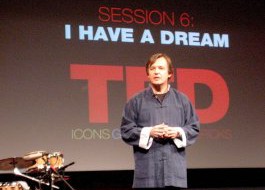
Parents want their kids to be successful. So when I saw that Tony Robbins was giving child-raising advice, I paid attention.
Robbins is one of the most successful motivational speakers and leadership coaches of all time, with top CEOs paying him $1 million or more per year for one-on-one coaching. He spends more than 200 days annually running sell-out events (with ticket prices deep into the four-figure range), and he's the author of several number-one bestselling books, among them "Money: Master the Game" (2014), and his massive 1991 bestseller, "Awaken the Giant Within."
If you know anything about Robbins's personal story, however, you might know that his childhood was pretty rough: His parents divorced when he was 7 years old. Money was always tight. He grew up with a mother who has been described as an abusive alcoholic and a pill user — plus a series of stepfathers and father figures.
Robbins broke with his family when he was 17, reportedly after his mother chased him out of their house with a knife. He got a job as a janitor to support himself, but ultimately linked up with self-help guru Jim Rohn in the 1980s. He then started working on his own books and programs, which became massively successful.
Inc.com recently asked Robbins, whose son Jariek Robbins is also a successful motivational speaker and performance coach, for his best thoughts on raising kids to be entrepreneurs. More broadly, he advised that to help them achieve success, parents should speak to their children in ways that help them achieve a growth mindset.
The growth mindset
When praising kids, Robbins says, the key is, "don't tell them how perfect they are, how beautiful they are, how smart they are, how unique and special they are." Instead, offer praise and encouragement that focuses on the effort they expend to overcome problems — "persistence, determination, constantly flexing your approach."
Certainly, Robbins is not the first to make this suggestion. As he told Inc.com, his advice is based on the work of Stanford University psychologist Carol Dweck, whose teachings I've explored at greater length in previous columns. In short, a growth mindset is probably easiest to understand when you consider it in relation to its opposite, a fixed mindset.
As the name implies, a fixed mindset is a belief system that presumes that human achievement is based primarily on innate gifts. As a result, a person with a fixed mindset is likely to discount the roles played by effort, determination, or even working just to be in the right place at the right time, plays in success.
A person with a growth mindset, however, has internalized the belief that humans' ability to achieve is much more malleable and controllable. That means that we can increase our intelligence and problem-solving abilities over time, and that hard work, determination, and perseverance are at least as important as innate ability.
Developing belief in development
Every time I write about Dweck's work, I get comments and emails from adults who realize that they were raised to internalize a fixed mindset. In some cases, they've worked later in life to overcome it. Other times, it seems they're encountering these concepts for the first time — and they wonder whether it's too late to change the way they see things.
The good news is that it's certainly possible to redevelop your mindset as an adult. That said, it's probably more effective to be taught this as a child.
Dweck's most-cited research involves studies with middle schoolers and 11-year-olds. (More details here.) But she says her research shows that even when we're talking about children as young as a year to 3 years old, parents can help them develop growth mindsets. And that in turn affects how they approach challenges and succeed in early elementary school. Dweck has also been known to confront parents in public who are praising their kids the wrong way.
Persistence, hard work, and effort
There's a lot more to Dweck's work, but I was very happy to see her results cited by Robbins when he had time in the interview to share only one single, most important piece of parenting advice.
Kids who develop growth mindsets set higher goals, had a healthier attitude toward effort and failure, and were less likely to complain about being "bored" (which fixed-mindset kids use as a cover or excuse to explain why they don't try difficult things). As Robbins puts it:
"If you teach them — "Honey you did so great on that because look, you never gave up! You kept persisting." Or, 'Look what you did here, by constantly pushing yourself harder and harder until you broke through. I'm so proud of you!' That type of shaping will make a person grow up where they will value persistence, hard work [and] effort, which is where all rewards come from — in business and personal life."Read the original article on Inc.. Copyright 2017. Follow Inc. on Twitter.




